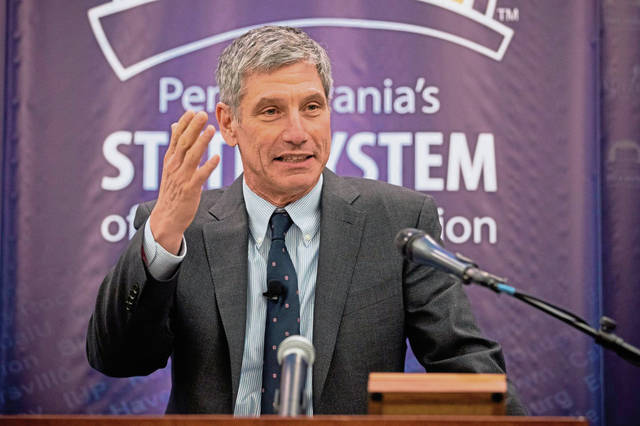The Pennsylvania State System of Higher Education will move forward to consolidate California, Clarion and Edinboro universities into a single university in Western Pennsylvania, the state schools’ board of governors decided unanimously Wednesday.
Work also is underway to combine Bloomsburg, Lock Haven and Mansfield universities into a single unit in Northeastern Pennsylvania.
The vote to approve the plan, the biggest change in State System history, sets the stage for the combined institutions to begin enrolling students under a new banner by fall 2022. The motion also expressly prohibited the closing of any of the six campuses during consolidation.
The vote comes four years into a sweeping State System redesign and after a year of study into integrating six struggling universities into two consolidated universities.
The original proposal looked at consolidating Clarion and California in one match and Edinboro with Slippery Rock in another match. Officials later pivoted and decided on the current configuration that left Slippery Rock as a stand alone institution and placed California with Clarion and Edinboro.
The other universities in the system, created in 1982, are Cheyney, East Stroudsburg, Indiana, Kutztown, Millersville, Shippensburg and West Chester.
Systemwide, the schools have faced multiple challenges. A declining pool of high school graduates has contributed to a 28% overall decline in enrollment and even greater losses at individual universities over the past decade and a heavier tuition burden on a smaller group of students. Critics say a relatively low level of state subsidies — Pennsylvania routinely ranks 47th or 48th in the U.S. in support for higher education — also has contributed to increasing tuition at the schools that are charged with offering affordable access to higher education.
The consolidation plans call for California to act as the anchor institution for the western consolidated university, while Bloomsburg would play the same role in the northeast.
The plan drew extensive criticism during a series of public forums this spring. Students, faculty and community members voiced fears that consolidation could have adverse academic and economics impacts in the towns where the universities are anchor institutions. Most were founded as teacher prep academies around the time of the Civil War.
During a public comment period Wednesday, a half-dozen students and faculty members asked the board to table or oppose the move. A pair of local trustees — one from Edinboro, another from Clarion — went on the record in support of the move.
Jamie Martin, president of the union that represents about 5,000 coaches and faculty members across the system, expressed continuing reservations, saying she does not believe recent student surveys were representative of broader concerns she has heard from students and prospective students. She asked that system officials continue to seek input from students when they return this fall.
“I hope that the plan that is considered today is not the end, not the beginning of the end, but the end of the beginning,” Martin said.
System officials insisted studies and projections suggested consolidation was the best way for the schools to move forward in a sustainable fashion.
Chancellor Dan Greenstein said the forums had been positive and helped officials adjust their plans in accord with several concerns, including extending the time period for blending and developing curriculum among the participating schools from one to three years and taking a closer look at student preferences and the economic impact of the consolidations.
“We’ve listened and reviewed all of the comments, and we listened carefully,” Greenstein said.
Dale-Elizabeth Pehrsson, who has participated in the study as president of Clarion and acting president of Edinboro, said the consolidated universities will offer more opportunities to traditional and nontraditional students. She said fears that traditional students will lose major programs or have to travel to take courses are unfounded. As for non-traditional students, officials hope to expand on the online offerings already available
“We designed programs around our students,” Pehrsson said. “We designed this whole thing so students would be front and center.”
Although the mega schools would operate under a single administration and be accredited as two universities, state law prohibited the closing of any campuses. And while officials said students at the six schools still will be able to graduate from their universities in the programs they are taking, multiple unknowns remain.
The schools will begin to review marketing studies seeking to name the consolidated institutions as officials continue efforts to accredit the mega schools through the Middles States Association of Colleges and Schools and seek approval from the NCAA to continue offering the full array of collegiate sports now available at each individual campus.
The two organizations declined to act before the consolidation plans have been approved, and some have raised concerns about their potential action. Citing preliminary discussions with Middle States and the NCAA, Greenstein said he believes the organizations will approve the plans.
Cynthia Shapira, chair of the PASSHE board, said she is grateful for the 1,100 people who weighed in with comments and the hundreds who worked on committees over the past year as officials weighed consolidation.
“This really speaks to the fact that there is so much passion and dedication to the concept of public higher education,” Shapira said. “And it’s done a lot to put PASSHE on the front burner of this commonwealth, which is where we belong.”








